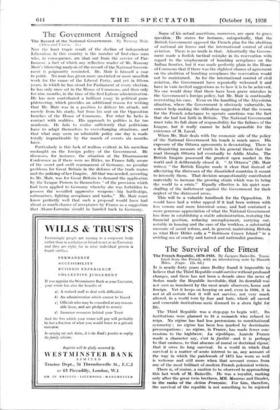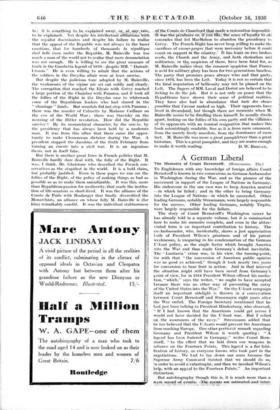The Survival of the Fittest
The French Republic, 1870-1935. By Sae:Claes tainville. Trans. lated from the French, with an introductory note by Hamish Miles. (Cape. 12s. 6d.) IT is nearly -forty years since Bodley found it impossible to believe that the ThirdRepublic could survive without profound changes, and there has not been a decade since the news a Sedan made the Republic inevitable, that its downfall WaiT not teen as imminent by the most acute observers, home and foreign. Yet it keeps on keeping on and, even in 1936, it is not at all certain that it will not survive, not very much altered, in a world torn by Tear and hate, where all sacred and venerable institutions-seern doomed to n stern fight for. life.
The Third Republic was a stop-gap to begin with. Its institutions were planned to fit a monarch who refused to reign. No regime has had less pretensions to constitutional' symmetry; no regime has been less marked by doctrinaire- preoccupations ; no regime, in France,- has made fewer cori4 cessions to the highbrow. La republique, Anatole France made a character say, c'est in facilite—and it is perhap4. to that easiness, to that absence of moral or doctrinal rigour,' that it owes its long survival. In a world in which that survival is a matter of. acute interest to us, any account of the way in which the patchwork of 1875 has worn so well is welcome and still more when that account comes from one of the most brilliant of modern French polemical writers.
There is, of course, a caution to be observed in approaching this last work of If; BainVille. - He was a -royalist, ranking only after the great twin brethren; MM. Maurras and Daudet, in-the-ranks -of the Action Franfaise. For him, therefore, the survival of the republic is not something to be rejoiced in ; it is ,sompthing to.be. expjained away-,,,.%Attanykrate, to be explained. Yet despite his intellectual affiliations With 'the royalist doctrinaires and despite his failure to realise that the appeal of the Republic was not always to the baser emotions, that for hundreds of thousands la republique. etait belle even under the Republic, M. Bainville was too much a man of the world not to realise that mere denunciation was not enough: He is willing to see the great measure of truth in the Gambetta legend of 1870—ilespite 1101. " Dutrait- t'rozon." He is even willing to admit that the actions of the soldiers in the Dreyfus affair were at least unwise. But despite the judicious tone adopted by M. Bainville, the weaknesses of the regime are set out coldly arid- clearly. The corruption that reached the Elysee with Grevy reached a large portion of the Chainber-with Panama, and it took all the follies of the -Right in the Dreyfui case to whitewash some of the Republican leaders who had shared in the chantage " funds. But standals did not. stop with Panama ; there was the murder of Calmette by Madame Caillaux on the eve of the World War; there was Stavisky on the morning of the Hitler .revolution. How did the Republic survive ? By its monarchical character, by the senate, by the presidency that has always been held by a moderate man. It was from this office that there came the oppor- tunity to make Clemenceau dictator during the War. A president stopped the Jacobins of the Sixth February from turning an &wale into a civil war. It is an ingenious thesis, not in itself false. . But there is another great force in French politics that M. Bainville hardly dare . deal with, the folly of the Right. It was, I think, Mr. Gladstone who described the .French con- servatives as the stupidest in the world. It is a bold claim, but probably justified. Even in these pages we can see the - follies of the Right, of the policy of making things as bad as possible so as to make' them unendiurable.- It was this, more than Republican passion for mediocrity, that made the institu- tion of life-senators so short-lived It was the alliance Of the Comte de :Paris . with Boulanger that finally discredited the Monarchists, an alliance on whose folly M. Bainville is (for him) remarkably candid. It was the individual stubbornness the Comte de, Chambordtkat, made arestoration impossible. 4k,--ivaathe' pe-tidtnite42.1,-,"if sreetittireiw:seiise'orioyatik"ti6 6rd comrades that led MacMahon to abandon the presidency to Grevy. The French Right has never beep illing to make the merifices of amour-propre that were necessary before it could count on support' in the ealuitry: ft has leant on two broken reeds, the Church and the Army, and_both clericalism and militarism, or tali,. suspicion of them, have been fatal for, as M. Bainville makes 'clear, the'eommon syspicion that France is avid for military glory has been for two generations baseless. The party that promises peace always wins and that party, since 1876, has been the Left. TOday it is not so certain that the fatal imputation of bellicosity may not be pinned on the Left. The fingers of MM. Laval and Doriot are believed.to be itching to do the job. But it is not only on peace that the Republicans have shown their sense of political realities. They have also had in abundance that tack (les ,,ehoses possibks that Cavour ranked so high. - Their opponents, have lived in dreamland, but though there are moments when M. Bainville seni tohe 4iivnifig. there himself, 'he ligually (livens apart, looking on the follies of -his own party and the vilUdnies of its opponents -with an ironical resignation that makes: this book astonishingly readable, free as it is from mere ornament, from the merely lively anecdote, from the dominance of mere fact. M. Bainville was more a great pamphleteer than a great historian. This is a great pamphlet, and they are scarce enough





















































 Previous page
Previous page